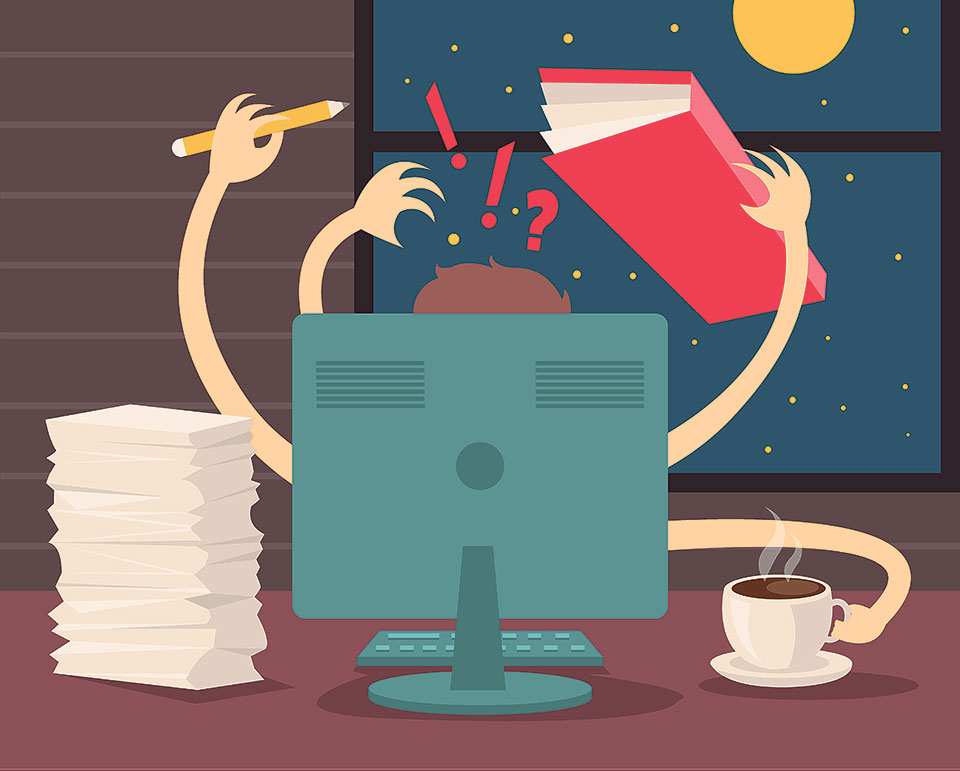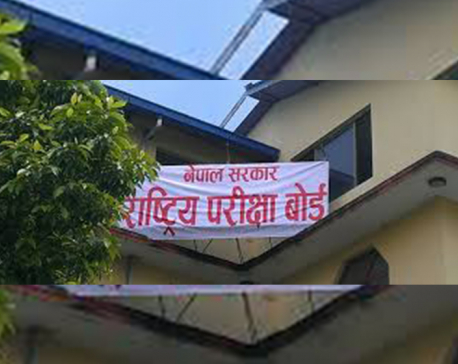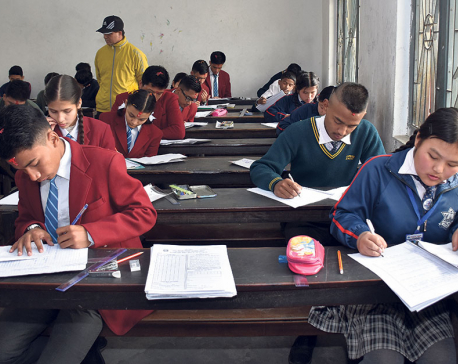
OR
expression

In Nepal, exams are the nucleus of our education system and the focus is not so much on educating students but rather on examining the life out of them. As a process, it gets more frequent the higher up you go in our education system – you start off with one set of exams during SLC (now SEE), then one set of exams every year during your plus two years (NEB), then exams every six months (semester) during college and then your Master’s degree which is just one continuous cycle of assessments, presentations, reports and – no points for guessing it – exams!
Each exam supposedly brings you closer to your life’s aim – which in reality is some dead-end job. I suppose that sounds really presumptive but that’s how we educate our kids – not to think for themselves but to parrot lines and concepts to get through this or that exam. It means that, as a whole, our system expends more effort in aiming to prove students are literate than actually educating them.
So, for folks outside the loop, here’s a rough guide to the whole process. (The following situations are based on true stories and all the characters and incidents in this article are real and any resemblance to any person is wholly intentional.)
A – Gearing up for the exams
Exams here are periodical events where you attempt to study and prepare yourself in advance, fully aware that as usual it is going to come down to last minute overnight cramming. And why does anyone have to bother with the syllabus when a mini ‘knowledge management’ industry exists to get you through the exams: From obvious tips like big margins and even bigger handwriting to repeating the same points again and again like a broken record. Or better still, just writing the lyrics of any song that you know.
But the best – and my personal favourite – aid is the ‘Old is Gold’ phenomenon. Yes people, our syllabuses are often so out-dated and stale that you can actually predict, with considerable accuracy I might add, the kind of questions that will come and prepare specifically for them. That really doesn’t make a convincing case for exams, does it? But here we are continuing to soldier on with the same system.
Also, a weird psychological thing in our part of the world is that none of us ever admit to studying. In fact, you will find people constantly telling one another, even after they enter the exam hall that they haven’t studied anything at all. Apparently, it’s a matter of shame to be prepared and ready for your exams.
B – The exam
There are of course worse things than preparing for the exams – like finding out you are sitting in the front of the exam hall or fighting back your tears after reading the questions. And this feeling of helplessness makes people want to resort to unfair means. In Nepal, cheating is a full-time job and one that I never quite understood because, on the balance of things, it is (I kid you not) a lot harder than actually studying.
A couple of years ago, right before I was to start invigilating exams, I found myself eating lunch at a restaurant near the exam centre. While I was eating lunch, two students walked in all hustle and bustle with a bunch of papers printed with the smallest font I have ever seen (a 100/100 for the effort). While I looked on, they proceeded to tear these pages into neat little pieces to stuff into their sleeves, socks, belts and other places that are too gross to mention. We exchanged smiles and even spoke for a bit before I left. Their faces made for quite the picture when they came face to face with me at the exam hall.
Cheating aside, what reduces the effects of exams is often erroneous thinking. For example, our administrators seem to think that academic rigor is directly proportional to the duration of exams. Apparently, there are four- or five-hour exams these days. Soon our exams are going to be so long that, in addition to your pen and other stationery, you will be required to bring three days’ worth of food, toothbrush, and a sleeping bag.
C – Declaration of marks
After you get over the trauma of the exams, the board will make you wait so long for your marks that you will stop caring anymore and will have probably moved on to other things. Every year I wonder how some students in particular get through the exams, even after accounting for last minute studies and it is something that remains beyond my comprehension. This particular phenomenon, more than most, is perhaps the most damning indictment of our examination system.
It’s also bizarre how parents base their assessments of a child’s capabilities on the evaluation of an examiner, who has probably corrected a thousand papers in one sitting. They are paid peanuts for it and when you pay peanuts you get monkeys i.e. a lot of corners will be cut. You can see why students say they can get away with writing just about anything on the answer sheet and still clear their exams.
D – Fallout
A lot of parents have such low standards that a JP (just pass) is a minor miracle but for the majority, the declaration serves as a chance to see where their kids stand – vis a vis their cousins. Let’s face it – that’s why god makes cousins so that your parents can berate you for not doing as well as them.
All said and done, exams exist to remind you of how you have failed your family and your ancestors who came from far flung places with just a small bag of possessions, grafted hard to make a living, sacrificed their lives – only for you to go and mess up your exams. But if you ever feel down, remember that there is still one area where education, examinations, and grades don’t matter at all – politics. Now if that’s not a reassuring thought, then I don’t know what is.
The writer loves traveling, writing, and good food when he is afforded an escape from the rat race. He can be contacted at gunjan.u@gmail.com
You May Like This

Result of SEE exams to be announced on July 26
KATHMANDU, July 22: The National Examinations Board is preparing to announce the results of this year's Secondary Education Examination (SEE)... Read More...

People start taking Grade 10 exams easy
Four different sets of question papers used for the first time ... Read More...

The ABCs of archery
Archery is a sport that requires a person to shoot with a bow and arrow at a given target. This... Read More...



Just In
- Govt receives 1,658 proposals for startup loans; Minimum of 50 points required for eligibility
- Unified Socialist leader Sodari appointed Sudurpaschim CM
- One Nepali dies in UAE flood
- Madhesh Province CM Yadav expands cabinet
- 12-hour OPD service at Damauli Hospital from Thursday
- Lawmaker Dr Sharma provides Rs 2 million to children's hospital
- BFIs' lending to private sector increases by only 4.3 percent to Rs 5.087 trillion in first eight months of current FY
- NEPSE nosedives 19.56 points; daily turnover falls to Rs 2.09 billion
















Leave A Comment